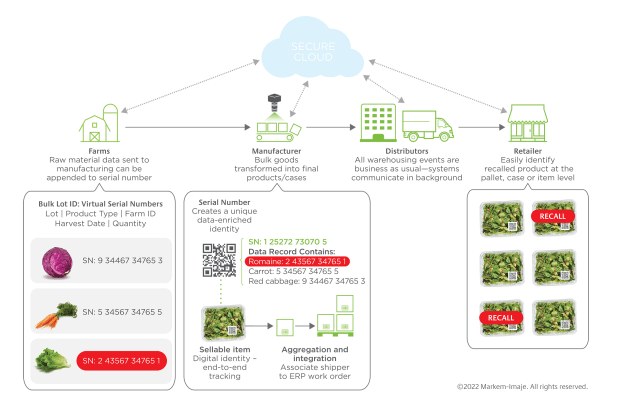Supply chain management is going through unprecedented change. Manufacturers across all sectors are experiencing the dual pressures of a volatile business environment and consumers’ increased expectations for greater transparency.
This has placed a particular burden on brands in the food and beverage market which also saw swift and irreversible changes in consumer purchasing behaviour caused by the global pandemic. Add to this the ongoing rise in counterfeit products across all categories.
With disruption as the new normal, it is imperative that manufacturers not only gain control of their costs and exposure to risk, but also futureproof their supply chains.
The answer to all of these challenges? Traceability.
Understanding the obstacles
A range of issues are placing pressure on supply chains in Australia and globally. They include:
- Supply and labour shortages are driving market volatility. According to the OECD, Australia has the second most severe labor and skills shortage in the world.
- Changes in regulations and legislation mandate the ability to track and trace specific products throughout the supply chain.
- The increase in counterfeit and pirated goods is having a significant impact on profits and brand integrity.
- The massive increase in online shopping and the growing consumer demand for transparency (particularly in the food and beverage market) has led to a seismic shift in consumer behaviours and expectations.
Advancing performance and customer relationships
Although many organisations have access to some level of traceability through various partners in the sourcing and distribution chain, this data is often siloed, fragmented and inconsistent.
In contrast, the most advanced traceability solutions empower manufacturers to more easily identify and capture the data they need for key supply chain metrics. This proven end-to-end supply chain traceability technology enables them to build, measure and improve performance. Companies recognise the benefits of track and trace capabilities to manage risk, enhance consumer relationships, identify inefficiencies and optimise operations all the way from raw material sourcing to consumer purchase.
With these systems in place, brands are also able to track and record every product and transaction in their chain of custody. They can instantly confirm which products are where and verify the supply chain partners who have them.
The use of this type of traceability technology within food control systems enables companies to better manage potential hazards which may lead to recalls, ensure that product information is reliable and guarantee the authenticity and safety of products. Companies are also able to benefit from deep insight and data which actively drives consumer engagement and brand performance.
Taking the first step
While the benefits are clear, transforming a supply chain can be a complex challenge. A key first step for organisations is to own their comprehensive traceability capabilities. This means gaining a clear understanding of existing supply chain networks before setting concrete goals. As well as helping to define a strategy for future success, this also sets out the best route and the right conditions to identify a technology partner who will establish the traceability initiatives that will deliver the most value.
The foundation of supply chain success
At Systech, we know that there is little doubt that supply chains will continue to be complex and demanding for companies. Failing to take measures to manage poses a real risk for manufacturers, both operationally and from a brand protection perspective. The critical level of visibility required to address this with actionable, real-time knowledge is achievable through the right approach to traceability.
Organisations can reap the rewards of adopting a robust traceability program which does much more than resolve the day-to-day challenges of getting products from factory to customer. An effective approach provides a vital combination of data, flexibility and comprehensive insight to transform a supply chain into a competitive advantage.
Read more about beginning your traceability journey with the Systech white paper.
(Tessa Eastman is connected products strategist at Markem Imaje).







